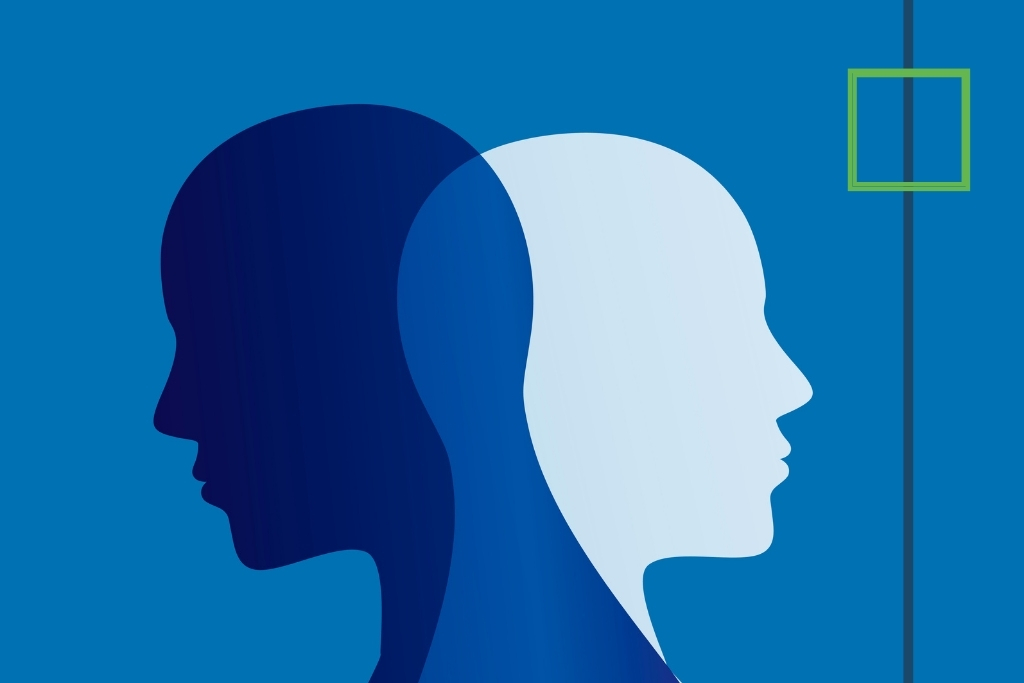What is BPD?
Borderline personality disorder (BPD) is a mental illness characterized by an ongoing pattern of varying moods, self-image, and behavior. These symptoms often result in impulsive actions and problems in relationships. In addition, individuals with a borderline personality disorder may experience intense episodes of anger, depression, and anxiety that can last from a few hours to days [1].
BPD is a misunderstood mental health disorder that can have serious consequences, especially when left untreated. It was first called BPD in the 1930s. At that time, professionals believed people with these symptoms were in a state of mental illness between neurosis and psychosis but did not have the same mental health break that a condition like schizophrenia offers.
Over time, we’ve learned that BPD is its own type of mental health disorder. However, an excellent way to understand what makes it different is to consider it a disorder related to emotional regulation rather than a disorder of thought processes. Most often, individuals with BPD develop the condition in early adulthood, though it can happen at any age. Individuals suffering from BPD can see improvement if they seek help and learn more about their emotions and thought patterns.


Get Your Life Back
Find Hope & Recovery. Get Safe Comfortable Detox, Addiction Rehab & Mental Health Dual Diagnosis High-Quality Care at the We Level Up Treatment Centers Network.
Hotline (877) 378-4154What causes BPD and Its Symptoms
- People with BPD experience rapid mood swings and display uncertainty about how they see themselves and their role in the world. As a result, their interests and values can change quickly
- Impulsivity. This means that you like to do things on the spur of the moment
- Feeling bad about yourself
- Controlling your emotions
- Self-harming behavior, such as cutting
- Suicidal thoughts and attempts to take your own life because of fear of separation or rejection
- Ongoing feelings of emptiness
- Rapid changes in self-identity and self-image that include shifting goals and values, and seeing yourself as bad or as if you don’t exist at all
- Feeling paranoid or depressed
- Hearing voices or noises when you are stressed
- Intense but unstable relationships with others
If you’re aware that you have any of the signs or symptoms above, talk to your doctor or a mental health provider. If you have fantasies or mental images about hurting yourself or have other suicidal thoughts, get help right away.
What causes BPD
There’s no single cause of borderline personality disorder (BPD) and it’s possible to be caused by a variety of factors.
Genetics
Genes you inherit from your parents may make you more vulnerable to developing BPD. A study found that if 1 identical twin had BPD, there was a 2-in-3 chance that the other identical twin would also have BPD. However, these results have to be treated with caution, and there’s no evidence of a gene for BPD.
Get Help. Get Better. Get Your Life Back.
Searching for Accredited Drug & Alcohol Rehab Centers Near You? Or Mental Health Support?
Even if you have failed previously, relapsed, or are in a difficult crisis, we stand ready to support you. Our trusted behavioral health specialists will not give up on you. Call us when you feel ready or want someone to speak to about therapy alternatives to change your life. Even if we cannot assist you, we will lead you wherever you can get support. There is no obligation. Call our hotline today.
FREE Addiction Hotline – Call 24/7Problem with brain chemicals
It’s thought that many people with BPD have something wrong with the neurotransmitters in their brain, particularly serotonin.
Neurotransmitters are “messenger chemicals” used by your brain to transmit signals between brain cells. Altered levels of serotonin have been linked to depression, aggression and difficulty controlling destructive urges.
Problem with brain development
Researchers have used MRI to study the brains of people with BPD. MRI scans use strong magnetic fields and radio waves to produce a detailed image of the inside of the body.
The scans revealed that in many people with BPD, 3 parts of the brain were either smaller than expected or had unusual levels of activity. These parts were:
- The amygdala – which plays an important role in regulating emotions, especially the more “negative” emotions, such as fear, aggression and anxiety
- The hippocampus – which helps regulate behavior and self-control
- The orbitofrontal cortex – which is involved in planning and decision making

Problems with these parts of the brain may well contribute to symptoms of BPD. The development of these parts of the brain is affected by your early upbringing. These parts of your brain are also responsible for mood regulation, which may account for some of the problems people with BPD have in close relationships.
Environmental factors
A number of environmental factors seem to be common and widespread among people with BPD. These include:
- Being a victim of emotional, physical or sexual abuse
- Being exposed to long-term fear or distress as a child
- Being neglected by 1 or both parents
- Growing up with another family member who had a serious mental health condition, such as bipolar disorder or a drink or drug misuse problem
A person’s relationship with their parents and family has a strong influence on how they come to see the world and what they believe about other people. Unresolved fear, anger and distress from childhood can lead to a variety of distorted adult thinking patterns, such as:
- Idealizing others
- Expecting others to be a parent to you
- Expecting other people to bully you
- Behaving as if other people are adults and you’re not
Comfortable Facilities & Amenities
High-Quality Addiction & Mental Health Rehabilitation Treatment
Rehab Centers TourRenowned Addiction Centers. Serene Private Facilities. Inpatient rehab programs vary.
Addiction Helpline (877) 378-4154Proven recovery success experience, backed by a Team w/ History of:
15+
Years of Unified Experience
100s
5-Star Reviews Across Our Centers
10K
Recovery Success Stories Across Our Network
- Low Patient to Therapist Ratio
- Onsite Medical Detox Center
- Comprehensive Dual-Diagnosis Treatment
- Complimentary Family & Alumni Programs
- Coaching, Recovery & Personal Development Events
How common is borderline personality disorder?
According to the National Center for Biotechnology Information (NCBI) [2], surveys have estimated the prevalence of borderline personality disorder to be 1.6% in the general population and 20% in the inpatient psychiatric population. Nearly 75% of people diagnosed with BPD are women. Recent research suggests that men may be equally affected by BPD, but are commonly misdiagnosed with PTSD or depression.
Up until a few decades ago, those diagnosed with the disorder were thought to be untreatable. Despite this shift, individuals living with BPD continue to face surplus stigma. However, evidence-based treatments have helped change the narrative for people with the disorder to one of recovery and hope.
How Is BPD Diagnosed?
Most often, clinicians will spend some time monitoring behavior to formally diagnose BPD. However, it’s not uncommon for people with this condition to seek out help because they want to stop feeling the way they do. Therapists may work to understand the potential causes to understand better what is happening.
Self-harm or suicide attempts will land a person in the hospital in many situations. However, they may receive counseling and support at that time to pinpoint their condition. Unfortunately, many people find themselves getting help for the first time in this manner.
There isn’t a medical test to confirm a borderline personality disorder (BPD) diagnosis. Instead, your provider may do a physical exam or order a blood test to rule out health conditions that may be causing your symptoms. Healthcare providers diagnose BPD after several interviews with you. Your provider might also talk to your family members or friends.
The interviews will include questions about your symptoms, relationships, behaviors, and mental health history. BPD often occurs along with other mental health conditions. Your provider will work with you to get a clear picture of your unique symptoms and overall health.
Effects of BPD on Your Life
An individual showing qualities of BPD is likely to notice an impact on every aspect of their daily lives. Because there is little control in these constant mood swings, it can impact most types of relationships.
Consider some of BPD symptoms to see how this can change an individual’s behavior throughout any given day.
- An individual may have an irrational fear of abandonment, leading to their avoidance of ever being alone.
- Recurrent ideas of suicide can happen, including gestures and outward threats.
- Chronic feelings of being empty or lacking purpose are common, often making them apathetic to the day’s happenings.
- Impulsiveness can strain relationships as well as put individuals at risk. Some demonstrate this through the use of substances.
- Anger and rage episodes can cause a variety of complications to day-to-day activities, making school and work difficult to manage.
- Relationships tend to be very strained, especially when other people don’t understand what is happening.
Realizing how this impacts day-to-day life can be a challenge for someone looking into the situation. For example, a person with BPD may seem to have everything they want and need but constantly seem hard to deal with and even emotionally unstable at times.
Related Conditions
BPD can be difficult to diagnose and treat, and successful treatment includes addressing any other conditions a person might have. Many with BPD also experience additional conditions like:
- Depression
- Eating Disorders (notably bulimia nervosa)
- Substance Use Disorders / Dual Diagnosis
Link BPD and Addiction
Borderline personality disorder (BPD) is a mental health condition that affects an individual’s pattern of moods, self-image, and behavior. Those with BPD experience a distorted perception of themselves and reality, in general. These inner experiences often lead to a tendency for impulsive actions and unstable relationships. Like most mental health conditions, and especially personality disorders, people with BPD may turn to substance use as a way to cope with their disorder. This can easily become an addiction, also called a substance use disorder (SUD).

Substance abuse is common among people with BPD. Additionally, people with BPD are more likely to struggle with polydrug abuse, ingesting multiple drugs at once to change or enhance the high. According to the National Center for Biotechnology Information (NCBI) [3], for decades, clinicians and researchers have recognized that borderline personality disorder (BPD) and substance use disorders (SUDs) are often diagnosed within the same person.
Disorders with the highest rates of co-occurrence with BPD are mood, anxiety, substance use, and non-BPD personality disorders. The question of whether SUDs are a cause or consequence of BPD cannot be answered definitively. However, because common genetic, personality and early environmental influences predate overt substance use, it seems unlikely that BPDs are simply secondary to substance use disorder.
World-class, Accredited, 5-Star Reviewed, Effective Addiction & Mental Health Programs. Complete Behavioral Health Inpatient Rehab, Detox plus Co-occuring Disorders Therapy.
CALL (877) 378-4154End the Addiction Pain. End the Emotional Rollercoaster. Get Your Life Back. Start Drug, Alcohol & Dual Diagnosis Mental Health Treatment Now. Get Free No-obligation Guidance by Substance Abuse Specialists Who Understand Addiction & Mental Health Recovery & Know How to Help.
BPD Treatment
An effective BPD treatment plan should address any other co-existing conditions you may have, also known as dual diagnosis. Examples of treatment options include psychotherapy, medications, and group, peer, and family support. The goal of treatment is for a person with BPD to increasingly self-direct their treatment plan as they learn what works and what doesn’t.
- Psychotherapy—such as dialectical behavioral therapy (DBT), cognitive behavioral therapy (CBT) and psychodynamic psychotherapy—is the first line of choice for BPD. Learning ways to cope with emotional dysregulation in a therapeutic setting is often the key to long-term improvement for those experiencing BPD.
- Medications may be instrumental to a treatment plan, but there is no one medication specifically made to treat the core symptoms of BPD. Rather, several medications can be used off-label to treat various symptoms. For example, mood stabilizers and antidepressants help with mood swings and dysphoria. And for some, low-dose antipsychotic medication may help control symptoms such as disorganized thinking.
Find the Right Treatment at We Level Up NJ
BPD increases the risk that an individual will engage in self-destructive behavior, harm themselves, or attempt suicide. Fortunately, there are effective treatments available.
The National Institute on Drug Abuse (NIDA) [4], recommends psychotherapy for people with BPD and substance abuse. Furthermore, dual diagnosis integrated therapy to address what causes BPD and its symptoms and symptoms can help redirect the individual’s focus to developing new skills and employment prospects.
If you or your loved one is dealing with BPD, treatment is a must. To learn more, contact us today at We Level Up NJ; we provide utmost care with doctors and medical staff available 24/7 for life-changing and lasting recovery. We provide an enhanced opportunity to return to a fulfilling and productive life.

Experience Transformative Recovery at the We Level Up Treatment Center.
See our authentic success stories. Get inspired. Get the help you deserve.



Start a New Life
Begin with a free call to an addiction & behavioral health treatment advisor. Learn more about our dual-diagnosis programs. The We Level Up treatment center network delivers various recovery programs at each treatment facility. Call to learn more.
- Personalized Care
- Caring Accountable Staff
- Comfortable Amenities
- Licensed & Accredited
- Renowned w/ 5-Star Reviews